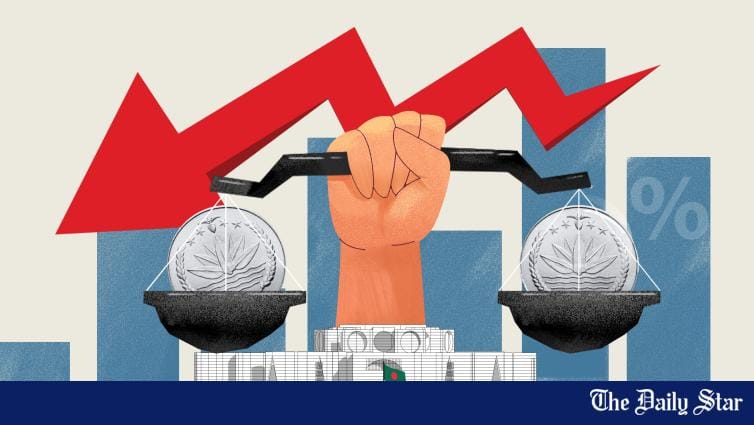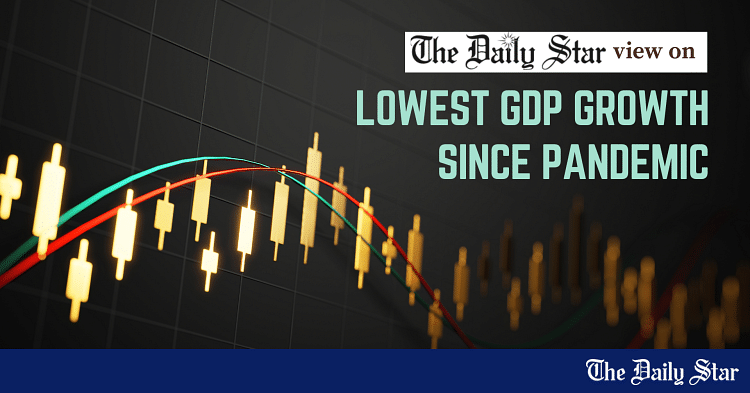Saif
Senior Member
- Joined
- Jan 24, 2024
- Messages
- 17,262
- Likes
- 8,334
- Nation

- Residence

- Axis Group


Opting for realistic budget targets
As the countdown to the national budget announcement begins, expectations for a realistic and targeted approach from the interim government rather than ambitious, sweeping promises would not be misplaced. Such a pragmatic stance is necessary, given the diverse and pressing challenges confronting th
Opting for realistic budget targets
Published :
May 30, 2025 00:13
Updated :
May 30, 2025 00:13

As the countdown to the national budget announcement begins, expectations for a realistic and targeted approach from the interim government rather than ambitious, sweeping promises would not be misplaced. Such a pragmatic stance is necessary, given the diverse and pressing challenges confronting the economy at this critical juncture. Broadly, trade expansion, employment generation, and investment promotion are expected to feature prominently on the government's spending priority list --- an indication reinforced by Finance Adviser Dr. Salehuddin Ahmed in his recent interview with The Financial Express.
With the economy still reeling from the aftershocks of recent political unrest, Dr. Ahmed finds himself navigating a tight fiscal space. "Resource gap is the main challenge in budget formulation," he stated, emphasising the need for strategic resource mobilisation. The government, he revealed, plans to tap into foreign budget-support credits while also focusing on domestic avenues --- taxation, bank borrowing, and bond issuance --- to bridge the fiscal gap. Unlike previous administrations, the current government is intent on crafting a budget grounded in realism, focusing on clearly defined, attainable goals within available resources, he said.
Dr. Ahmed highlighted the importance of harmonising fiscal and monetary policies and ensuring judicious use of allocated funds, rather than expanding indiscriminately. In this context, the Annual Development Programme (ADP) will see reductions, which he admitted could affect employment. He, however, maintained that the government is consciously avoiding large, capital-intensive megaprojects and shifting its development strategy.
Media reports indicate that health and education --- two sectors chronically underfunded --- will again fall short of receiving meaningful increases. Despite expectations for corrective allocations from the interim government, no significant change appears likely. Dr. Ahmed's emphasis on skills and capacity development over infrastructure investments in these sectors may reflect a practical stance, but it fails to fully address the sectors' dire needs. It is critical that allocations are adequately matched to address glaring deficits in healthcare and education service delivery.
In a move aimed at fostering innovation and job creation, Dr. Ahmed mentioned that a dedicated fund will be introduced to support start-ups and new entrepreneurs. Furthermore, he hinted at widening the regulatory gap between listed and non-listed companies, and curtailing export incentives. The government is also looking to reduce tax expenditures by cutting back on exemptions granted through statutory regulatory orders (SROs) that often go beyond budget sanction.
The proposed budget outlay stands at Tk 7.90 trillion --- marginally lower than the current Tk 7.97 trillion. Revenue earnings have been targeted at Tk 5.18 trillion, with ADP spending set at Tk 2.30 trillion. The GDP growth target is 5.5 per cent, and inflation is expected to be brought down to 6.5 per cent from the current 9.0 per cent. The budget deficit is projected at Tk 2.26 trillion, or 3.62 per cent of GDP, which is estimated at Tk 62.5 trillion. Given the contractionary nature of this budget, it is imperative that sufficient attention is directed towards supporting small and medium enterprises, enhancing credit access for rural businesses, and bolstering sector-specific development, especially in agriculture, fisheries, and cottage industries.
Published :
May 30, 2025 00:13
Updated :
May 30, 2025 00:13
As the countdown to the national budget announcement begins, expectations for a realistic and targeted approach from the interim government rather than ambitious, sweeping promises would not be misplaced. Such a pragmatic stance is necessary, given the diverse and pressing challenges confronting the economy at this critical juncture. Broadly, trade expansion, employment generation, and investment promotion are expected to feature prominently on the government's spending priority list --- an indication reinforced by Finance Adviser Dr. Salehuddin Ahmed in his recent interview with The Financial Express.
With the economy still reeling from the aftershocks of recent political unrest, Dr. Ahmed finds himself navigating a tight fiscal space. "Resource gap is the main challenge in budget formulation," he stated, emphasising the need for strategic resource mobilisation. The government, he revealed, plans to tap into foreign budget-support credits while also focusing on domestic avenues --- taxation, bank borrowing, and bond issuance --- to bridge the fiscal gap. Unlike previous administrations, the current government is intent on crafting a budget grounded in realism, focusing on clearly defined, attainable goals within available resources, he said.
Dr. Ahmed highlighted the importance of harmonising fiscal and monetary policies and ensuring judicious use of allocated funds, rather than expanding indiscriminately. In this context, the Annual Development Programme (ADP) will see reductions, which he admitted could affect employment. He, however, maintained that the government is consciously avoiding large, capital-intensive megaprojects and shifting its development strategy.
Media reports indicate that health and education --- two sectors chronically underfunded --- will again fall short of receiving meaningful increases. Despite expectations for corrective allocations from the interim government, no significant change appears likely. Dr. Ahmed's emphasis on skills and capacity development over infrastructure investments in these sectors may reflect a practical stance, but it fails to fully address the sectors' dire needs. It is critical that allocations are adequately matched to address glaring deficits in healthcare and education service delivery.
In a move aimed at fostering innovation and job creation, Dr. Ahmed mentioned that a dedicated fund will be introduced to support start-ups and new entrepreneurs. Furthermore, he hinted at widening the regulatory gap between listed and non-listed companies, and curtailing export incentives. The government is also looking to reduce tax expenditures by cutting back on exemptions granted through statutory regulatory orders (SROs) that often go beyond budget sanction.
The proposed budget outlay stands at Tk 7.90 trillion --- marginally lower than the current Tk 7.97 trillion. Revenue earnings have been targeted at Tk 5.18 trillion, with ADP spending set at Tk 2.30 trillion. The GDP growth target is 5.5 per cent, and inflation is expected to be brought down to 6.5 per cent from the current 9.0 per cent. The budget deficit is projected at Tk 2.26 trillion, or 3.62 per cent of GDP, which is estimated at Tk 62.5 trillion. Given the contractionary nature of this budget, it is imperative that sufficient attention is directed towards supporting small and medium enterprises, enhancing credit access for rural businesses, and bolstering sector-specific development, especially in agriculture, fisheries, and cottage industries.








































